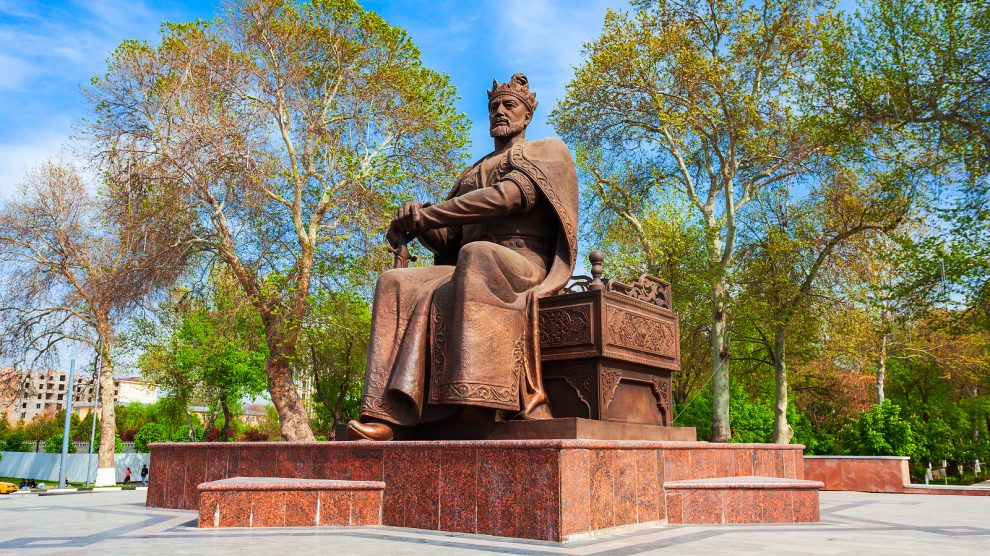President Joe Biden this week met with the five Central Asian heads of state—the first time a president of the United States has done so. While the West is eager to increase its footprint in a region historically dominated by Russia and China, it faces difficult trade-offs between securing energy resources and promoting human rights.
On September 19, United States President Joe Biden met with the leaders of the five Central Asian republics (Kazakhstan, Kyrgyzstan, Tajikistan, Turkmenistan, Uzbekistan) on the sidelines of the United Nations General Assembly in New York City. While there have been C5+1 meetings of Central Asian foreign ministers and the US Secretary of State every year since 2015, this is the first time the format has been elevated to the level of head of state. Russian president Vladimir Putin and Chinese leader Xi Jinping have both already held summits with all five Central Asian leaders.
“This is a historic moment,” said President Biden. “We’re building on years of close cooperation between Central Asia and the United States—a cooperation that is grounded in our shared commitment to sovereignty, independence, territorial integrity. These principles matter more than ever, in my view. And today, we’re taking our cooperation to new heights.”
- Global uncertainty is bringing Central Asia and the Gulf States closer together
- An alternative to Russia and China: Turkey’s role in the South Caucasus and Central Asia
- Kazakhstan is becoming a regional hub for foreign investment
He announced efforts to strengthen counterterrorism cooperation, including increased US security funding to Central Asia; deepen regional economic connectivity, including establishing a new business platform to complement diplomatic engagement and better connect private sectors; and expand dialogue on critical mineral supply chains. A new initiative on disability rights was also launched.
Absent from his public remarks, however, was any mention of the promotion of democracy and civil liberties in the region. His embrace of rhetoric about sovereignty, independence, and territorial integrity—all frequently used in official Chinese remarks—reflect a prioritisation of realpolitik over values in American geostrategy, despite the urgings of prominent human rights organisations.
Regional engagement on the rise
While global interest in Central Asia has been on the rise for years, Russia’s invasion of Ukraine in 2022 scrambled supply chains and increased efforts by the US, European Union, Turkey, Gulf states, and China to source grain and fossil fuels from the region and route trade through Central Asia instead of Russia.
Heightened tensions between the US and China have also pushed Western firms to begin “de-risking” supply chains by lessening dependence on China—which has created new interest in Central Asia as a source of critical minerals essential to the green transition, military technology, and batteries.
Although Kazakhstan and Uzbekistan dominate the region in population and gross domestic product, international engagement with the region has shifted away from a model based on bilateral relations with each country in favour of summits with representatives of all five Central Asian nations presents.
Border conflicts and closures, water insecurity, and a lack of coordination on soft connectivity issues—regulation, digitisation, and services required to maintain trade network’s long-term integration and sustainability—all require regional solutions.
Encouraging other regions and countries to engage with Central Asia as a bloc also helps its smaller countries get in on bigger projects, as other world powers often prioritise bilateral meetings with only the largest markets and energy producers in the region.
Do the right thing
Human rights advocates worry that as Western leaders prioritise deeper engagement with Central Asian governments, they will become more willing to overlook rights abuses.
“As the US and EU look to strengthen ties with Central Asia following Russia’s escalation of its war on Ukraine, they should seek guarantees on fundamental standards of the rule of law and human rights,” said Iskra Kirova, Europe and Central Asia advocacy director at Human Rights Watch (HRW). “Biden should ask for explicit steps to end politically motivated prosecutions, suppression of free speech, and impunity for torture and police brutality.”
HRW warns Kyrgyzstan is rapidly moving away from its one-time status as the most vibrant space for civil society and media in the region as its government cracks down on independent media outlets and passes a new Russian-style law prohibiting “LGBT propaganda.”
In Kazakhstan, there has been little accountability for the human rights violations of last year’s “Bloody January,” which saw excessive use of force against protesters, arbitrary arrests and detention, and ill-treatment and torture of detainees. Similarly, HRW criticises a lack of accountability for the government of Uzbekistan’s “heavy-handed response to protests in the autonomous region of Karakalpakstan in July 2022, in which at least 21 people died and hundreds were badly injured.”
Tajikistan has disbanded many of the country’s civil society organisations and violently repressed peaceful gatherings in the Gorno Badakshan Autonomous Oblast (GBAO) over 2021-2022. HRW writes that “Turkmenistan remains one of the most closed and repressive countries in the world.”
The West’s rivals for influence in Central Asia refuse to criticise the human rights records of its leaders. Publicly committing to protect sovereignty, independence, and territorial integrity over democracy, rule of law, and human rights assures Central Asian governments that the United States is serious about doing business and will not embarrass them with their shortcomings in liberalism—even if it costs Washington its principles.
Unlike many news and information platforms, Emerging Europe is free to read, and always will be. There is no paywall here. We are independent, not affiliated with nor representing any political party or business organisation. We want the very best for emerging Europe, nothing more, nothing less. Your support will help us continue to spread the word about this amazing region.
You can contribute here. Thank you.


